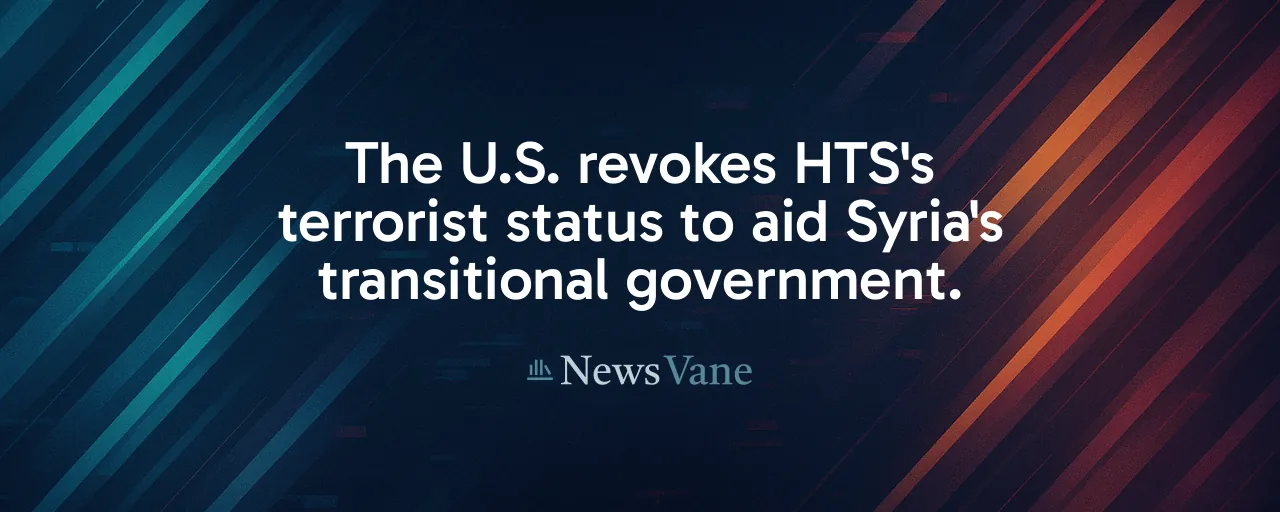A Bold Move in Damascus
The United States has taken a striking step in its Syria policy, announcing on July 7, 2025, the revocation of the Foreign Terrorist Organization designation for Hay'at Tahrir al-Sham, once known as al-Nusrah Front. Effective July 8, this decision aims to bolster Syria's fledgling transitional government under President Ahmed al-Sharaa. It follows a June 30 executive order lifting most economic sanctions, signaling Washington's intent to prioritize stabilization over prolonged punitive measures.
This shift responds to Syria's dramatic changes since the fall of Bashar al-Assad in December 2024. The new government's pledge to combat terrorism and the reported dissolution of HTS on January 29, 2025, have prompted optimism in some quarters. The move raises critical questions about balancing economic recovery with security and accountability. How can Syria rebuild without reigniting extremism or sidelining justice for past abuses?
Why Now? The Stakes Explained
The decision hinges on HTS's evolution from an al-Qaeda affiliate, designated a terrorist group in 2012, to a dominant rebel force that helped oust Assad. By March 2025, HTS's political leader, Ahmed al-Sharaa, emerged as interim president, backed by a five-year interim constitution promising minority protections. The U.S. sees this as a chance to support a government that could counter both ISIS and Iranian influence while fostering economic growth.
Economic stakes are high. Experts estimate $10 to $15 billion in foreign investment could flow into Syria over five years if banking channels reopen. This could ease food and medicine shortages, addressing dire civilian needs. Rapid sanctions relief, however, carries risks, as weak institutions may struggle to manage corruption or ensure equitable resource distribution, particularly for Kurdish and other minority communities.
Lessons From the Past
History offers valuable insights. Post-conflict studies show that economic incentives, like sanctions relief, can reduce the likelihood of renewed civil war when paired with strong security reforms. Nations that rebuilt with robust governance saw sustained GDP growth. Premature easing of restrictions, as seen in some cases, led to corruption and power imbalances, undermining long-term stability.
The 2012 delisting of the People's Mujahedin of Iran serves as a cautionary tale. While it enabled political reintegration, allegations of whitewashing past abuses sparked controversy. Syria's case is distinct but shares the challenge of ensuring former militants do not exploit newfound legitimacy to evade accountability or rearm under new guises.
Balancing Act: Security vs. Progress
Security remains a top concern. HTS commanded 12,000 fighters at its peak, and while it claims dissolution, verifying this is complex with limited on-ground access. The U.S. and its allies need to establish rigorous vetting to prevent ex-fighters from infiltrating state security forces. A 65% drop in hostilities since Assad's fall is promising, but residual extremist networks could regroup if oversight falters.
Human rights groups highlight another tension: justice for HTS's documented abuses, including detentions and executions in Idlib from 2018 to 2023. Victims demand accountability, and rapid normalization risks alienating them. A phased approach, tying delisting to disarmament and transparent legal processes, could address these concerns while advancing reconstruction.
Global Eyes on Syria
The decision reverberates beyond Syria's borders. Turkey, Israel, and Gulf states are recalibrating their security strategies, while Iran may seek to exploit transitional gaps. The United Nations, where al-Nusrah remains a listed terrorist entity, faces pressure to align with U.S. policy or risk irrelevance in shaping Syria's future. International investors and humanitarian agencies, meanwhile, weigh the risks of entering a fragile market.
Congress holds a pivotal role, with the authority to review the delisting through a joint resolution. Bipartisan oversight, including quarterly compliance reports from the State and Treasury Departments, could ensure the policy stays on track. Harmonizing U.S. and European regulations will also be crucial to avoid conflicting banking rules that could deter investment.
A Path to Stability?
Syria's rebuilding demands a delicate balance. Economic relief and delisting HTS could unlock resources and legitimacy for the Sharaa government, reducing refugee flows and easing regional burdens. Without robust checks, these steps risk empowering unreformed extremists or fueling corruption. A step-by-step process, blending incentives with accountability, offers a pragmatic way forward.
International monitoring, including UN and EU involvement, could verify HTS's dissolution and ensure reconstruction funds reach civilians transparently. Civil society groups emphasize inclusive governance to prevent marginalizing minorities. These measures, while complex, align with evidence that sustained peace requires both economic and institutional foundations.
The U.S. decision to delist HTS is a gamble with high stakes. It could pave the way for a stable Syria or invite new challenges if not carefully managed. As the world watches, the focus remains on ensuring Syria's new chapter prioritizes security, justice, and opportunity for all its people.
